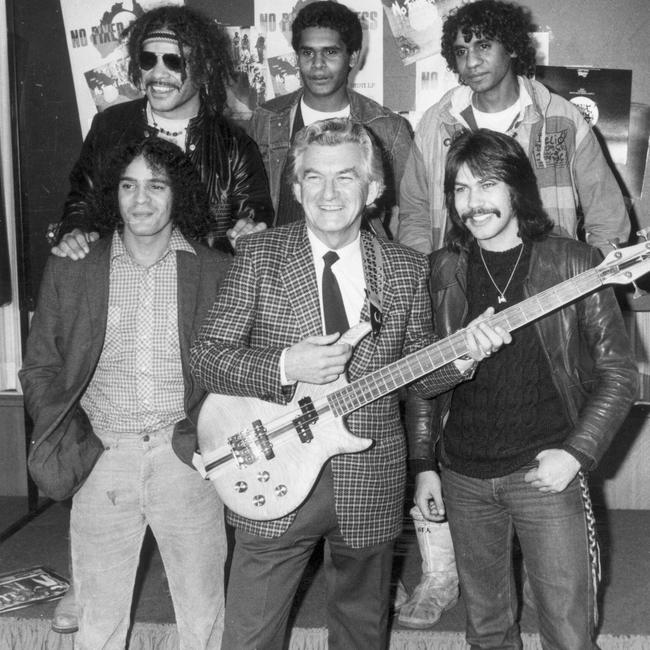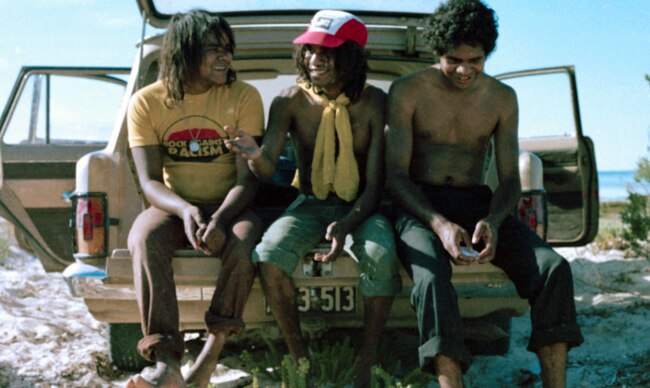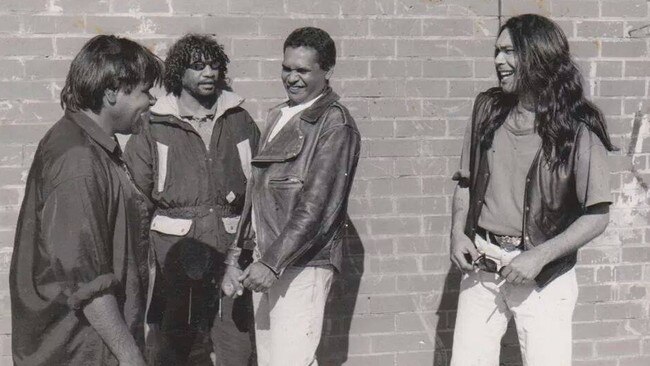Roots, rock, reggae: How No Fixed Address changed Australian music
They burst onto the Adelaide music scene then the national stage, but blazing a trail for Indigenous rock wasn’t always easy.
Entertainment
Don't miss out on the headlines from Entertainment. Followed categories will be added to My News.
Halfway down Rundle Mall is a laneway that, until very recently, was named after 19th century distiller and coppersmith Mr H. Linde.
Now, in a move that’s sure to confuse posties around the city – and perhaps annoy the ghost of Mr Linde – the thoroughfare is known as No Fixed Address Lane.
It’s a small, but important, symbol of recognition for a band that shook up Adelaide’s music scene like few others in the 1980s. Talented, energetic, political and, at times, angry.

But that angry energy, guitarist Les Graham says, was fuelled by some of the treatment No Fixed Address received when they were a bunch of kids out of the Centre for Aboriginal Studies in Music trying to get a foothold in the then-bustling pub rock circuit.
Despite the rave reviews and growing fan base, publicans and promoters would still regularly pull the pin on No Fixed Address shows after finding out they were black.
“A lot of the early gigs were cancelled when they found out we were an Aboriginal outfit,” Graham says from his Murray Bridge home.
“We found it really hard to get gigs but I think they were just uneducated people. They thought we were wild-blooded people who were going to destroy the place. Obviously that wasn’t the case. We were a well-behaved crowd.”
Graham says the band – himself, Victorian songwriter and rhythm guitarist Ricky Harrison, vocalist Bart Willoughby and bassist John Miller, both from South Australia’s West Coast, and late sax player Veronica Rankine, from the southeast – channelled the frustration they felt back into the music.

“We started out as a commercial band, singing open-hearted love songs,” Graham says. “But when they started rejecting us, what could we do? We turned political. We fought back through the music.”
And the vehicle they chose for this fightback was the one that other oppressed people around the world were using to tell their stories – reggae music.
Bob Marley and the Wailers were one of the biggest acts in the world at the time and their message – along with those of other Jamaican artists such as Peter Tosh and Burning Spear – were inspiring musicians on a global scale.
“We were definitely influenced by Bob Marley and The Wailers,” Graham says. “A few Jamaican musicians came and saw us while we were rehearsing and taught us how to play reggae better.
“They steered us away from country rock and more towards reggae. We call our music rock and reggae.”

Support slots with Tosh, Cold Chisel, Skyhooks, The Clash and Ian Dury and the Blockheads saw No Fixed Address’s star rise and they even managed to get then-prime minister Bob Hawke to launch their debut mini LP, From My Eyes.
They were also the first all-Aboriginal band to tour overseas and even starred in their own movie, Wrong Side of the Road, alongside fellow indigenous act Us Mob.
For Graham, the glory years of No Fixed Address had some serious highlights. “The only member of The Beatles we didn’t meet was John Lennon,” he says.
“We met Mick Jagger and Bill Wyman. We used to play a nightclub in Sydney called The Manzil Room – that’s where everyone went after their gigs and you’d meet everyone there. We’d start at 12 o’clock at night and walk out at six in the morning into the daylight.”
But there was a serious side, too – injecting an Indigenous voice into what was then a very white music scene.
“Skyhooks – we played with them in the early ’80s – said we were the first Aboriginal people they’d ever sat down and had a conversation with,” Graham says.
Music writer Donald Robertson, who edited music magazine Roadrunner out of Adelaide in the late 1970s and early ’80s, was a champion for the band from its very beginning.

Mr Robertson ran No Fixed Address’s picture on the cover and, to this day, counts them among the best shows he’s ever seen in Adelaide, along with The Clash and Midnight Oil.
“They sounded like nobody else, in my experience, and they were the first band in a long, long time to send shivers down my spine,” Mr Robertson, who’s working on a book about the band, writes in the intro notes to a blog post on his cover piece from the time.
“I got to know them and, as they didn’t have a manager, I tried to help them out.
“I found them some gigs, took Don Walker from Cold Chisel to see them one night at Hartley College of Advanced Education in Magill – which resulted in a support slot on one of Chisel’s national tours – and when the combination of the magazine and the band got too much, introduced them to Redgum’s manager, Chris Gunn, who took them under his wing.
“And off they went to (some) fame and (I suspect, not very much) fortune in the Australian music machine of the 1980s.”
No Fixed Address plays The Governor Hindmarsh Hotel with special guests Paradise Club on Thursday, March 25. Tickets at thegov.com.au



